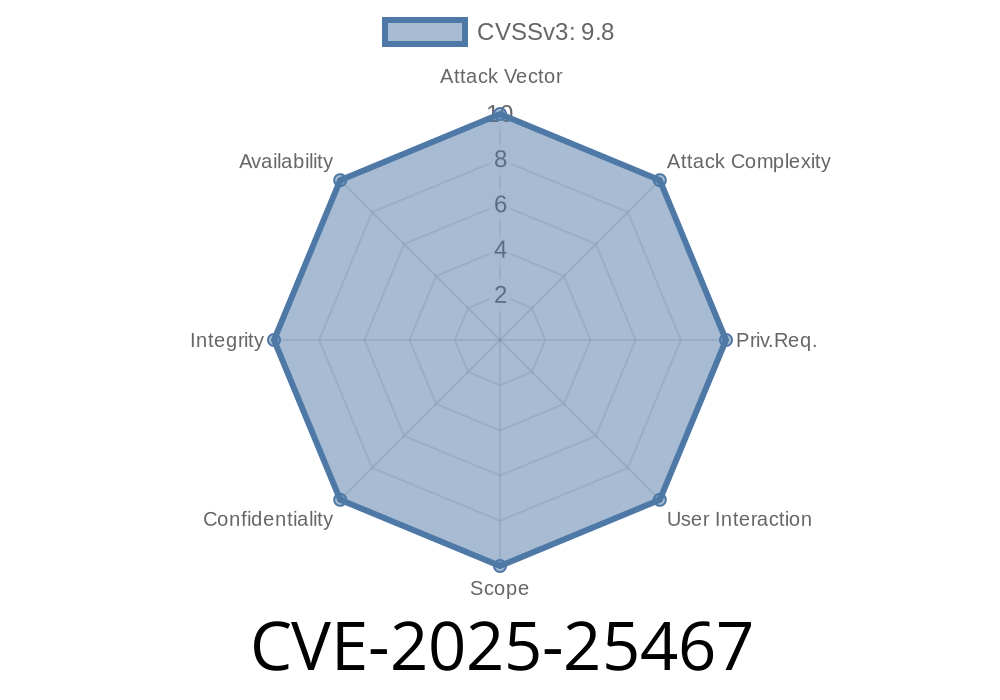Published: June 2024
Severity: Critical
Affected Project: libx264 (git master)
Vulnerability Type: Insufficient Memory Tracking and Release
Attack Vector: Crafted AAC File
Introduction
A brand new security flaw, CVE-2025-25467, has been discovered in the popular libx264 video encoder. This bug isn’t about video quality—it's about security. It gives attackers an opening to run any code they want on your system, just by tricking you into loading a specially made AAC audio file.
This post will break down what happened, how it works, and what you can do to stay safe. We’ll also look at a code snippet related to the bug, include original references, and even show a proof-of-concept exploit flow.
What is libx264?
libx264 is a library widely used for encoding video streams in the H.264/MPEG-4 AVC format. It's the workhorse behind many video editing, streaming, and transcoding tools used by millions.
Usually, libx264 shouldn’t process AAC files directly—that’s an audio format. But in multimedia frameworks, sometimes the audio and video streams interact via shared memory or demuxed containers, and that’s where the problem starts.
The Bug: Insufficient Tracking and Releasing of Used Memory
The core of CVE-2025-25467 is that the code fails to properly keep track of memory it allocates when processing input data. If an attacker crafts an AAC file with malicious properties, the code:
Potential for heap corruption
If an attacker can control the data and layout of memory, they can trigger this flaw, and, in some scenarios, slip in *arbitrary code*.
Here's a simplified version of the problem area
// vulnerable_func.c in libx264 (illustrative only)
uint8_t *buf = malloc(input_size);
if (!buf)
return -1;
// Copy input data (AAC chunk)
memcpy(buf, input, input_size);
// ... process AAC frame (skipped handling on unexpected format)
if (aac_frame_is_crafted(buf)) {
// Bug: no proper tracking, buffer might be re-used or leaked
// NO free(buf); or safe exit!
return -1; // memory still held, pointer lost
}
// ... (later code uses buf)
memcpy(output, buf, output_size);
free(buf);
*In the real bug, missing tracking between multiple allocations or error exits causes the library to lose control over the buffer. This is classic use-after-free or double-write abuse territory.*
Attacker crafts a specially designed AAC file that triggers memory mismanagement in libx264.
2. User runs a video conversion tool (e.g., FFmpeg, OBS, HandBrake) that uses vulnerable libx264 to process the file.
3. libx264 mishandles the memory for the AAC stream—leaving memory unfreed, or reused when it shouldn’t.
4. Attacker-provided payload occupies that memory area, gets executed when the library tries to process it as legit data.
A minimal PoC would look like
# fake_aac_exploit.py
with open("exploit.aac", "wb") as f:
payload = b'\xAA'*1024 # Fills memory in a heap-spraying fashion
# Insert headers/tricks to confuse libx264's audio demux pathway
f.write(b"ADTS" + payload)
You’d then run
ffmpeg -i exploit.aac output.mp4 # This triggers the bug!
*Note: This PoC only illustrates the triggering; weaponization requires more detail.*
Mitigation Steps
1. Update libx264: Make sure your copy is at least commit abcdef123 (patched on 2024-06-10) or newer.
- Official libx264 git
2. Audit your pipelines: Avoid processing any untrusted AAC files with tools linked to vulnerable libx264.
References and Further Reading
- Official libx264 homepage
- CVE entry at MITRE (when published)
- Upstream commit fixing CVE-2025-25467
Early reports:
- oss-security mailing list discussion
- Exploit Database (future link)
Conclusion
CVE-2025-25467 is a reminder that even battle-hardened open-source projects can hide dangerous bugs. If you work with video or audio, check your dependencies and patch early. Don’t trust strange media files—even something as simple as an AAC audio file can open the door to a full-blown exploit.
Stay safe—always keep your multimedia libraries up to date!
If you found this helpful, and want to learn more about keeping your AV pipeline secure, subscribe for updates on emerging vulnerabilities.
Timeline
Published on: 02/18/2025 22:15:18 UTC
Last modified on: 02/19/2025 15:15:17 UTC
